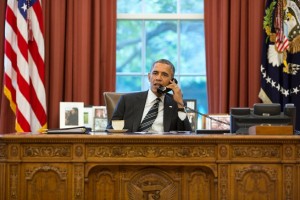Reprinted from Consortium News
After more than a year of negotiations between the United States and Iran, the two sides have failed to reach an agreement by the agreed deadline in July. They have agreed to continue negotiating, but the failure to meet the deadline was clearly not caused by the lack of time.
To understand why the talks have remained deadlocked, it is necessary to review the Obama administration's stance on diplomacy with Iran in the context of the long U.S. history of favoring "coercive diplomacy" over traditional negotiations in managing conflicts with adversaries.
Based on that military supremacy, the United States avoided negotiations with its communist adversaries up to the early 1970s, when Henry Kissinger courted China and launched his detente policy with the Soviet Union. But that brief period of serious negotiating came in the wake of political pressures for reducing U.S. military spending and foreign military presence during the long and exhausting U.S. war in Vietnam. It soon gave way to renewed reliance on coercive diplomacy during the Reagan administration.
The concept of coercive diplomacy emerged from the belief that the United States could use the threat of force to leverage favorable outcomes in international conflicts, as the United States assumed -- wrongly, as we now know -- that the threat of force by John F. Kennedy had forced Khrushchev to back down in the 1962 Cuban Missile Crisis.
But the practice of coercive diplomacy came to include the use of trade and technology denial for coercive purposes as well, and Iran was one of the first applications of the concept. The Reagan administration used its diplomatic clout with France and Germany to choke off all technical cooperation with Iran's nuclear program in 1983, even though it acknowledged it had no reason to suspect that Iran was pursuing nuclear weapons.
A few years later, the George H. W. Bush administration banned exports of peaceful nuclear technology to Iran and pressured its allies to do the same. The technology denial policy, aimed at strangling the Iranian nuclear program, was a pure expression of the concept of "coercive diplomacy."
The George W. Bush administration's accusation that Iran was using its nuclear program as a cover for development of nuclear weapons was aimed at preparing the political ground for regime change by force, if necessary. But in 2005, it became part of a strategy for coercive diplomacy to force Iran to stop enrichment.
U.S. Secretary of State, Condoleezza Rice, pressured Britain, France and Germany to eschew genuine negotiations with Iran and use the threat of economic sanctions to force an end to Iranian enrichment. The Bush administration would later accuse Iran of having a covert nuclear weapons program, based on intelligence documents that I have shown in my book Manufactured Crisis to be fabrications, but when it first used coercive diplomacy to force an end to Iran's nuclear program in the 1980s the Reagan administration did not claim that Iran had done anything to indicate an interest in nuclear weapons.
The Obama yearsIronically, although the Obama administration appeared to be committed to traditional diplomacy with Iran on the surface, his administration has relied even more heavily on coercive diplomacy against Iran than its predecessor.
Obama sent an unpublicized message to Supreme Leader Ali Khamenei in May 2009, offering to conduct talks with Iran on a range of issues "without preconditions," Gary Samore, a former Obama official, admitted last year. But within weeks of his inauguration, Obama gave his approval to a plan for cyber war against Iran's nuclear program in order to gain more leverage.
Khamenei did not know about the cyber-war decision. He did know, however, that Obama was planning to use new sanctions to compel Iran to accept these policy changes, which included the unfreezing of assets and the lifting of some sanctions.
When Iranian President Mahmoud Ahmadinejad asked in the spring of 2009 for the International Atomic Energy Agency's (IAEA) assistance in purchasing nuclear fuel for its Tehran Research Reactor, the Obama administration blocked Iran's recourse to the market, hoping to use Iran's need for fuel for the TRR to put additional pressure on Iran.
Samore drafted a proposal under which Iran would have to send as much as 75 to 80 percent of its stockpile of low-enriched uranium to Russia to be turned into fuel assemblies for the reactor, giving the U.S. a stronger position in future negotiations.
The Washington Post reported on Oct. 22, 2009, that US officials said the proposed uranium swap "would be only the first step in a difficult process to persuade Iran to suspend its uranium enrichment activities and that suspension remains the primary goal."
The administration even used its Nuclear Policy Review (NPR) in the spring of 2010 as a heavy-handed means of coercing Iran. The new nuclear policy suggested that Iran was one of the few exceptions to a policy of no first use of nuclear weapons in case of a conventional attack "against the US or its allies or partners."
(Note: You can view every article as one long page if you sign up as an Advocate Member, or higher).






